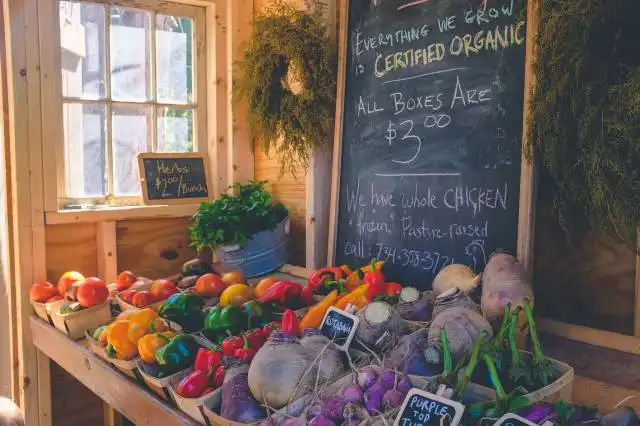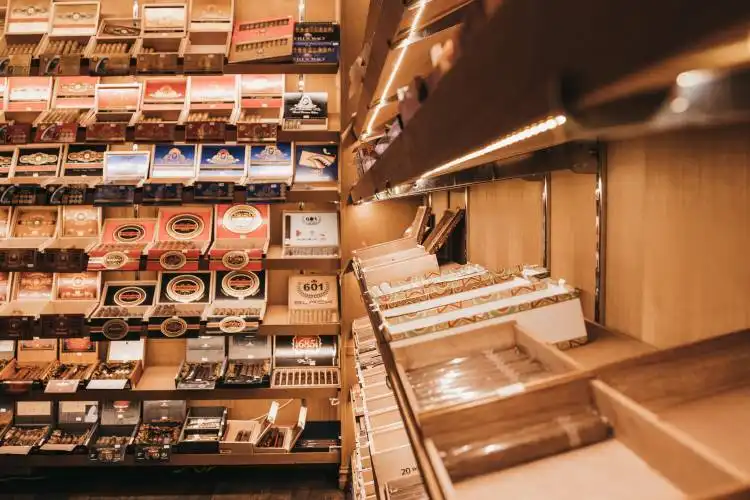Start a Distillery
Diving into the Tempting World of Craft Spirits: The Distillery Business Adventure
| Updated


DISTILLERY
Leap into the invigorating depths of a distillery business and let the intoxicating aroma of fermentation spark your entrepreneurial spirit. A distillery is a cornucopia of craft, blending unique ingredients into the timeless art of producing spirits like whiskey, vodka, rum, and more. Not for the faint of heart, this venture requires patience, passion, and a willingness to obey the stringent laws governing alcohol production. Indulge your taste buds, but remember, it's business first - so no free sips for the boss!
Jump to Business Plan
RELATED BUSINESS IDEAS
Browse ALL Food & Beverage Entrepreneurship Business Ideas
Discover Your Perfect Domain
Unlock the door to your online success with our hand-picked selection of premium domain names. Whether you're starting a new venture or rebranding an existing one, the right domain can set the tone for your digital presence. Browse through our curated list, each with its unique potential to enhance your brand's visibility and credibility.
DISTILLERY MINI BUSINESS PLAN
This a quick reality check to help you identify the strengths and weaknesses of your business concept before you dive in.
Expected Percent Margins:
- Gross Margin: 40-50%
- Net Profit Margin: 10-15%
Earnings Expectations:
- Daily Earnings: $200 - $700
- Weekly Earnings: $1,400 - $4,900
- Monthly Earnings: $6,000 - $21,000
- Annual Earnings: $72,000 - $252,000
Actions to Hit Those Numbers:
Production:
- Equipment: Secure necessary distilling equipment, including stills, fermenters, mash tuns, condensers. Initial investment could be $100,000 to $1,000,000.
- Ingredients: Create partnerships with local suppliers for consistent supply of high quality ingredients. Estimate monthly costs at 10-15% of sales.
Marketing and Customer Acquisition:
- Branding: Develop a memorable brand and craft unique, flavorful spirits that entice customers.
- Tours and Tastings: Offer distillery tours and tastings to attract local tourists and boost immediate sales.
Sales and Distribution:
- Direct Sales: Set up a craft distillery shop to sell directly to consumers.
- Wholesale Distribution: Establish relationships with liquor stores, bars, and restaurants to distribute your spirits.
Licensing:
- Permits: Obtain required federal, state, and local distilling licenses, which could cost between $5,000 to $10,000.
Cost Control:
- Utility Costs: Distilleries are energy-demanding operations. Budget accordingly for water and power costs.
- Excise Taxes: Plan for federal, state, and local alcohol taxes.
Your efforts in marketing, quality control, and distribution play crucial roles in your financial success. Always consult with a financial advisor and conduct a thorough business planning before commencing.
NOT WHAT YOU HAD IN MIND? Here are more ideas



Browse ALL Food & Beverage Entrepreneurship Business Ideas
Grab Your Business Website Name
Before you get caught up in the whirlwind of setting up your business, invest in a domain name. It's a small but significant step that lays the foundation for your brand and makes it easier for customers to find and trust you. Just like you wouldn't build a house without securing the land first, don't build a business without securing your domain name.
"Why? Can't that wait?" Here's why it shouldn't
Step 1: Determine if Starting a Distillery is the Right Endeavor
Breakdown of Startup Expenses
Starting a distillery requires a significant amount of capital. Before taking the plunge, it is important to understand the cost of the equipment, supplies, and licenses associated with the business. The cost of the equipment will vary depending on the size of the distillery and the type of spirits being produced. Additionally, the cost of supplies such as bottles, labels, and caps should be taken into consideration. Finally, the cost of the necessary licenses and permits should also be factored into the startup costs.
Breakdown of Ongoing Expenses
In addition to the startup costs, there are also ongoing expenses associated with running a distillery. These expenses include the cost of ingredients, utilities, and labor. The cost of ingredients will vary depending on the type of spirits being produced. Additionally, the cost of utilities such as water, electricity, and gas should be taken into consideration. Finally, the cost of labor should also be factored into the ongoing expenses.
Examples of Ways to Make Money
There are a variety of ways to make money with a distillery. The most common way is to sell the spirits directly to customers. This can be done through a tasting room, online store, or retail outlets. Additionally, distilleries can also make money by selling their products to bars, restaurants, and liquor stores. Finally, distilleries can also make money by offering tours and tastings at their facility.
Step 2: Name the Business
When it comes to naming a business, it is important to pick a name that is memorable, unique, and that reflects the values of the business. It's also important to make sure the name is available to use as a domain name and that it is not already trademarked. Here are a few tips for naming a distillery business:
Brainstorm: Start by brainstorming a list of potential names. Think of words that are related to the business, such as “spirits”, “distillery”, or “brewery”. Also, consider words that have a personal meaning to you or that are related to the area where the business is located.
Research: Once you have a list of potential names, research them to make sure they are available to use. Check to see if the domain name is available, and if the name is already trademarked.
Ask for Feedback: Ask friends and family for their opinion on the potential names. Get feedback from people you trust and who understand the business and its values.
Make it Memorable: Choose a name that is easy to remember and that will stand out from the competition. Consider using a play on words or a pun to make the name more memorable.
Keep it Short: Try to keep the name as short as possible. Long names can be difficult to remember and can be confusing when used in marketing materials.
Step 3: Obtain Licenses and Permits
Federal Licenses and Permits
Starting a distillery requires obtaining a federal permit from the Alcohol and Tobacco Tax and Trade Bureau (TTB). The TTB permit is necessary for any business that manufactures, bottles, or sells alcohol. The application process can take up to six months and requires a $1,000 fee. Additionally, the business must have a DUNS number and an Employer Identification Number (EIN) from the Internal Revenue Service (IRS). The business must also register with the IRS to pay taxes on the alcohol it produces.
State Licenses and Permits
In addition to the federal permits, the business must also obtain state licenses and permits. These permits vary by state, but generally include a license to manufacture and sell alcohol, a license to transport alcohol, and a license to serve alcohol. The business must also obtain a license to sell alcohol in the state where it is located. This license must be renewed annually and requires a fee. Additionally, the business must obtain a permit to serve alcohol on its premises. This permit must be renewed annually and requires a fee. Finally, the business must obtain a permit to transport alcohol from the state where it is located to other states. This permit must be renewed annually and requires a fee.
Step 4: Find a Location
Finding the right location for a distillery is an important step in the process of starting a business. It is important to consider the zoning laws of the area, as well as the size of the space needed for the distillery. It is also important to consider the cost of the space and the proximity to suppliers and customers. Additionally, you should consider the availability of utilities and the cost of those utilities.
Research Local Zoning Laws
Once you have identified potential locations, it is important to research the local zoning laws to ensure that the location is suitable for a distillery. You should also research the local regulations and licensing requirements to ensure that you are in compliance with all applicable laws. Additionally, you should research the local tax laws to ensure that you are in compliance with all applicable taxes.
Negotiate a Lease
Once you have identified a suitable location, you should negotiate a lease with the landlord. It is important to negotiate a lease that is favorable to your business and that allows you to operate your business without any restrictions. Additionally, you should ensure that the lease includes provisions for any necessary renovations or improvements that you may need to make to the space.
Secure Financing
Once you have negotiated a lease, you should secure financing for the purchase or lease of the space. This may include a loan from a bank or other financial institution, or it may include investments from friends and family. Additionally, you should research any grants or other funding sources that may be available to help you finance the purchase or lease of the space.
Step 5: Purchase Equipment
When starting a distillery, there are certain pieces of equipment that are necessary for the process. This includes a mash tun, a still, a fermentation tank, and a bottling machine. It is important to research the different types of equipment available and determine which is best suited for the distillery. Additionally, it is important to consider the cost of the equipment and the space needed to house it.
Where to Buy
Once the type of equipment needed has been determined, the next step is to purchase the equipment. There are many different places to purchase distilling equipment, including online retailers, local suppliers, and even used equipment. It is important to compare prices and quality before making a purchase. Additionally, it is important to consider the cost of shipping and any additional fees associated with the purchase.
Installation
Once the equipment has been purchased, the next step is to install the equipment. Depending on the type of equipment purchased, installation may require the assistance of a professional. It is important to research the installation process and make sure that all safety protocols are followed. Additionally, it is important to make sure that all of the equipment is properly connected and that the distillery is up to code.
Maintenance
Finally, it is important to consider the maintenance of the equipment. This includes regular cleaning and inspection of the equipment to ensure that it is functioning properly. Additionally, it is important to keep up with any necessary repairs and to make sure that the equipment is up to date with the latest safety regulations. This will ensure that the distillery is running smoothly and that the product is of the highest quality.
Step 6: Develop a Business Plan
When developing a business plan, there are several components that should be included. These components include a market analysis, a competitive analysis, a financial plan, and a marketing plan.
The market analysis should include an overview of the industry, an analysis of the target market, and a description of the product or service. The competitive analysis should include a comparison of the business to its competitors and an analysis of the competitive environment. The financial plan should include a breakdown of startup expenses, ongoing expenses, and potential sources of revenue. Finally, the marketing plan should include a description of the marketing strategies and tactics that will be used to promote the business.
Writing the Business Plan
Once the components of the business plan have been determined, the next step is to actually write the plan. This should include an executive summary, a description of the business, a description of the products or services, a market analysis, a competitive analysis, a financial plan, and a marketing plan.
When writing the business plan, it is important to be as detailed as possible. This includes providing detailed descriptions of the products or services, the target market, the competitive environment, and the marketing strategies and tactics. Additionally, the financial plan should include a breakdown of all startup and ongoing expenses, as well as potential sources of revenue.
Obtaining Financing
Once the business plan has been written, the next step is to obtain financing. This can include obtaining loans from banks, investors, or other sources. Additionally, the business may be eligible for grants or other forms of financing.
When obtaining financing, it is important to present the business plan in a professional manner. This includes providing detailed information about the business, the products or services, the target market, the competitive environment, and the financial plan. Additionally, it is important to provide detailed information about the management team and the qualifications of the team members.
Finalizing the Business Plan
Once financing has been obtained, the business plan should be finalized. This includes making any necessary changes to the business plan based on feedback from potential investors or lenders. Additionally, the business plan should be updated to reflect any changes in the competitive environment or the target market.
Finally, the business plan should be reviewed by a lawyer or other professional to ensure that it is legally compliant. This includes making sure that all of the necessary permits and licenses have been obtained and that the business is in compliance with all applicable laws and regulations.
Step 7: Secure Financing
Securing financing for a distillery is a critical step in the process. There are a variety of sources of financing available, including traditional bank loans, private investors, and crowdfunding. Traditional bank loans are often the most difficult to obtain, as banks are typically hesitant to lend to small businesses. Private investors can be a great source of financing, but they will often require a significant equity stake in the business. Crowdfunding is becoming increasingly popular for small businesses, and can be a great way to get the capital needed to start a distillery.
Considerations
When considering financing options, it is important to consider the terms of the loan or investment. It is also important to consider the potential risks associated with each option. For example, if a loan is secured with collateral, the collateral could be seized if the loan is not repaid. Additionally, private investors may require a significant equity stake in the business, which could reduce the potential return on investment for the business owner.
Tax Implications
It is also important to consider the tax implications of any financing options. For example, if a loan is secured with collateral, the interest paid on the loan may be tax deductible. Additionally, any equity investments may be subject to capital gains taxes. It is important to consult with a tax professional to ensure that all tax implications are taken into consideration.
Professional Assistance
Finally, it is important to seek professional assistance when considering financing options. A qualified accountant or financial advisor can help to ensure that the best financing option is chosen for the business. Additionally, they can help to ensure that all tax implications are taken into consideration.
Step 8: Market the Business
The eighth step in starting a distillery is to market the business. There are many strategies for marketing a distillery, including traditional advertising, online marketing, and word-of-mouth. Traditional advertising can include print, radio, and television advertisements. Online marketing can include creating a website, using social media, and creating email campaigns. Word-of-mouth marketing is the most powerful form of advertising and can be done through customer referrals, networking events, and industry events.
Develop an Online Presence
In addition to traditional and online marketing, it is important to develop an online presence for the distillery. This can include creating a website, creating social media accounts, and creating an email list. The website should include information about the distillery, its products, and its services. Social media accounts should be used to post updates, interact with customers, and promote events. An email list should be used to send out newsletters and other promotional materials.
Use Promotional Materials
Promotional materials, such as flyers, brochures, and business cards, can be used to spread the word about the distillery. Flyers can be distributed in local stores and restaurants, and brochures can be sent to potential customers. Business cards can be given to customers and potential customers to help them remember the distillery.
Participate in Events
Participating in local and industry events can help to spread the word about the distillery. Local events can include farmers markets, festivals, and trade shows. Industry events can include conferences, tastings, and competitions. Participating in these events can help to build relationships with customers and potential customers.
Step 9: Operate the Business
Operating a distillery is a complex endeavor that requires a lot of hard work and dedication. It is important to have a plan in place for how the business will be run and managed. This should include a clear understanding of the distilling process, the necessary equipment, and the legal requirements for operating a distillery. Additionally, it is important to have a plan for marketing the business and selling the products. It is also important to have a plan for managing the finances of the business, including budgeting, accounting, and taxes. Finally, it is important to have a plan for hiring and training staff, as well as for managing customer service.
Establishing a Brand
Once the business is up and running, it is important to establish a brand for the distillery. This should include creating a logo, designing labels, and developing a website. Additionally, it is important to create a story that will help to differentiate the business from other distilleries. This story should be used in all marketing materials and should be used to create an emotional connection with customers. It is also important to create a social media presence and to use it to engage with customers and to promote the business. Finally, it is important to establish relationships with distributors and retailers to ensure that the products are available to customers.
EXPLORE MORE CATEGORIES
Browse ALL Business Idea Categories
TAKE THE NEXT STEPS








